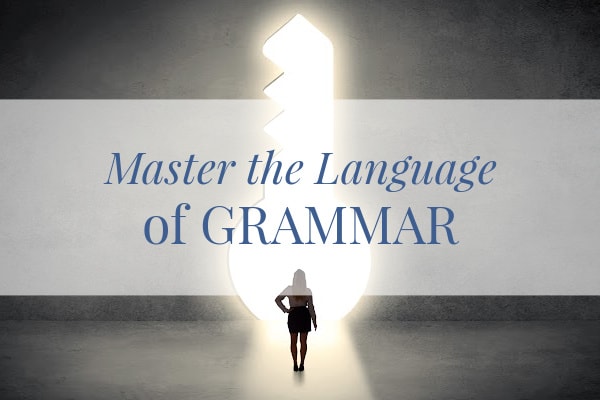9 Terms to Help You Improve Your Writing
Knowing the terminology for any topic helps you to understand it more fully. It only makes sense that learning the vocabulary of language and grammar will improve your command of the English language.
In this article I will go over some essential terms in the world of grammar and language, what they mean, and why they matter. For each term, I will include the dictionary definition from either Merriam-Webster or the American Heritage Dictionary that best conveys how the word is used in the context of writing.
At the end of the article, I give a simplified, plain-language definitions of each term for your reference.
Orthography
Orthography involves how you write words on a page. It comes from the Greek roots ὀρθός orthos meaning “correct” and γραφή graphe meaning “writing.”
Merriam-Webster’s dictionary defines orthography as “The art of writing words with the proper letters according to standard usage.”
It includes things like spelling, spacing, capitalization, and punctuation.
When you use a comma splice instead of a semicolon, this is an error of orthography. So is misspelling a word or mistakenly writing one word when a different word is meant. Most typos fall into this category as well.
Orthography errors are some of the most noticeable errors and tend to be easily recognizable. Be careful to check for them in anything you write.
Proofreading is a great way to illuminate these mistakes. So is regularly looking up any term whose spelling you are unsure of.
While it’s often clear what you meant to write, these errors can sometimes make your writing difficult to understand or cause your writing to say something completely different from what you meant it to.
Semantics
Semantics is about the meaning of words. The American Heritage Dictionary defines this term as “The meaning or the interpretation of a word, sentence, or other language form.”
Most words have multiple meanings, especially when they are used in several different contexts. And some words are chronically misused and misunderstood, which means that extra care is needed if you want people to understand you.
Pay attention to usage (which you can check by looking at a dictionary) to ensure that your understanding of a word matches the way the rest of the world will interpret it. Be careful that you are selecting the words that correctly convey the meaning you are going for and be aware of subtle nuances.
Grammar
Grammar is how you string words together to form comprehensible sentences.
As defined by the American Heritage Dictionary, it’s “The study of how words and their component parts combine to form sentences.”
Grammar is sometimes used as an umbrella term for the rules of language in general, but really it has narrower definition and is primarily made up of syntax and morphology.
Syntax is about how words combine to create phrases, while morphology is about how the words themselves are formed and comprises inflection, derivation, compounding.
Good grammar is essential for clear and effective writing. It is also a very large and complex subject area, which is why half of the terms on this article fall within this category.
Syntax
Syntax is an aspect of grammar that concerns word order and how different words and phrases fit together.
The American Heritage Dictionary describes syntax as “The study of the rules whereby words or other elements of sentence structure are combined to form grammatical sentences.”
In the English language, word order has a huge influence on the meaning of a sentence. If you scramble the word order, the meaning can change completely and will often become unintelligible. Even a small change in word order can create enough ambiguity that it is unclear what is being said.
In addition to word order, syntax governs overall sentence structure. You might remember learning about independent and dependent clauses in school and the way these clauses fit together to create simple, complex, or compound sentences. These sentence structures fall into the category of syntax.
Morphology
Morphology is the subcategory of grammar that deals with the form of words and how specific forms impact the meaning of a certain word. “Morphology” comes from two Greek words μορφή morphē meaning “form” and λογία logiᾱ “study.” This is the derivation (etymology) of the word, and derivation is a subset of morphology, so what I just gave you was actually the morphology of “morphology.”
The definition provided by the American Heritage Dictionary is “The study of the structure and form of words in language or a language, including inflection, derivation, and the formation of compounds.
Morphology encompasses the way words carry slightly different meanings when their form is altered, how a word has come into being, and how words are combined to form new words.
Inflection
Inflection is the subdivision of morphology that concerns the modifications made to a word to create a particular form that holds a certain meaning.
Merriam-Webster defines it as “The change of form that words undergo to mark such distinctions as those of case, gender, number, tense, person, mood, or voice.”
For example, verbs are inflected, undergo an alteration in form, based on whether the action occurred in the past or the present, whether the subject is singular or plural, and several other factors. The difference between “walk” and “walked” is one of inflection.
The plural marker “s,” which is added to nouns to show that they are plural rather than singular, is another example of inflection.
Inflection can involve adding the same series of letters to each word (walk/walked, cook/cooked), or it can be much more irregular as is the case with pronouns (I/me/we/us, she/her/they/them) and certain verbs (is/was/are/were).
Derivation
Derivation concerns how a word has come into being.
In the American Heritage Dictionary it is defined as “The historical origin and development of a word; an etymology.”
Derivation encompasses everything that brings a word from the earliest origins of its component parts to the form and meaning that it has today. It’s not just the roots that make up the word, but also any changes that it has undergone over time since it became a word.
People sometimes fall into the trap of defining a word solely based on its Greek or Latin roots. While this can be done for “morphology” with its relatively simple derivation, some words no longer have the same meaning as the roots they are made up of.
For example, the word “volatile” comes from the Latin verb volare “to fly” and adjective volatilis “flying.” In Middle English it referred to an animal that could fly. The chemical meaning of “easily vaporized” came about later and eventually turned into the figurative meaning of “unpredictable” that we know today. Modern usage always takes precedence over what a word may have meant in the past.
Diction
Diction involves how you choose your words and phrases. Good diction is essentially being precise about word choice.
According to Merriam-Webster, diction is “Choice of words especially with regard to correctness, clearness, or effectiveness.”
Diction matters because carelessly worded sentences are harder for people to understand and less articulate. Paying attention to diction can make your writing both clearer and more engaging.
To improve your diction, notice how each word functions in its sentence and determine whether there is an alternative word that would fit better and more accurately convey what you intend. If you are ever unsure whether you’re using the right word, try looking it up in a dictionary to confirm that you’re using it correctly, or use a thesaurus to see if there are better options.
Register
Register is about writing for your intended audience with the correct level of formality and technicality.
The American Heritage dictionary defines it as “A variety or level of language used in a specific social setting.”
Register is largely defined by who your audience is and the context in which you are writing.
If you’re writing a formal paper, you will want a formal register. On the other hand, you might want to use an informal, more conversational register in content intended for the general public or when sending an email to a friend.
If you’re writing about an advanced concept, you may want to use a register that avoids technologically complex terms so people with less knowledge about the topic can understand it. Alternatively, if you’re writing for other people in your field of expertise, you may want a more scientific register that includes any relevant jargon words.
Recognize these in your writing
Now that you are more familiar with these terms, you will have an easier time recognizing how they show up in your writing. Each of them is important for improving your understanding of the English language and can help you write more clearly to convey exactly what you intend to.
The following are simple definitions of each term in case you need a review:
Orthography – How words are written (ex. spelling and punctuation)
Semantics – The meanings of words
Grammar – Syntax and morphology
Syntax – How words combine to form sentences and phrases
Morphology – How words are formed: inflection, derivation, and compounding
Derivation – The origins of words and how they came into being
Inflection – Changes in form that indicate variation in meaning (ex. conjugation)
Diction – Word choice
Register – The type of language being used based on context and intended audience






